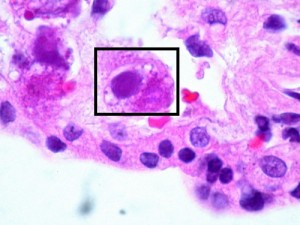TUESDAY, 5 OCTOBER 2010
Human cytomegalovirus (HCMV) is a clinically important herpesvirus that can be life-threatening for patients who are immunocompromised. It is also the leading viral cause of congenital disability and malformation, and has been placed in the highest priority bracket for the development of a vaccine. However, research on the virus has been hampered because clinical samples of the virus are difficult to grow outside of the human body, and strains that can be grown in the laboratory often undergo substantial genome alterations during passage in cell culture. Furthermore, HCMV has by far the largest genome of all viruses that infect humans, so it is extremely challenging to clone intact.Scientists from Cardiff and Glasgow have announced in The Journal of Clinical Investigation that they have reconstructed the complete HCMV genome in a Bacterial Artificial Chromosome (BAC). As a result, they now have a reliable copy of the virus' gene sequences and a reproducible source of clonal virus for pathogenicity studies. Unlike previously existing clones, their reconstructed genome fully represents the virus present in patients, which will greatly enhance the clinical relevance of future research. The virologists have also been able to identify the genetic factors that cause instability outside the body, and have produced cells in which the virus can grow.
The genome sequence of the clone has been designated the international reference for HCMV, and the BAC has been distributed to research groups worldwide. It is hoped that these advances will offer a vital step forward in the development of new treatments.
Written by Robert Jones

